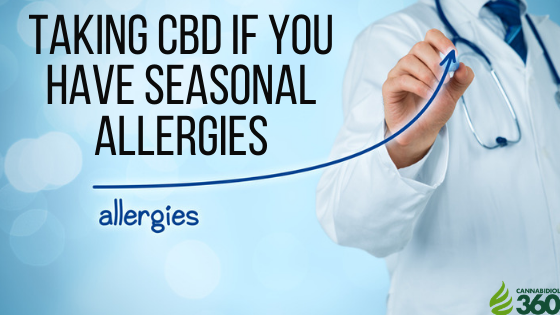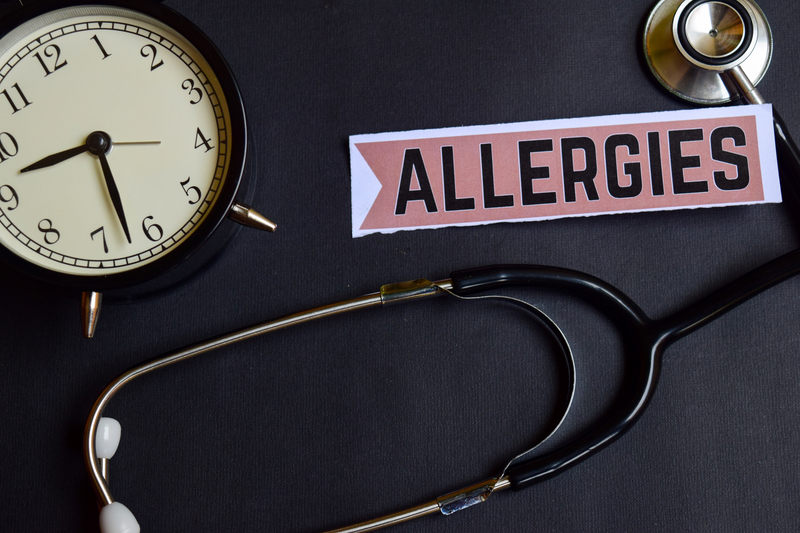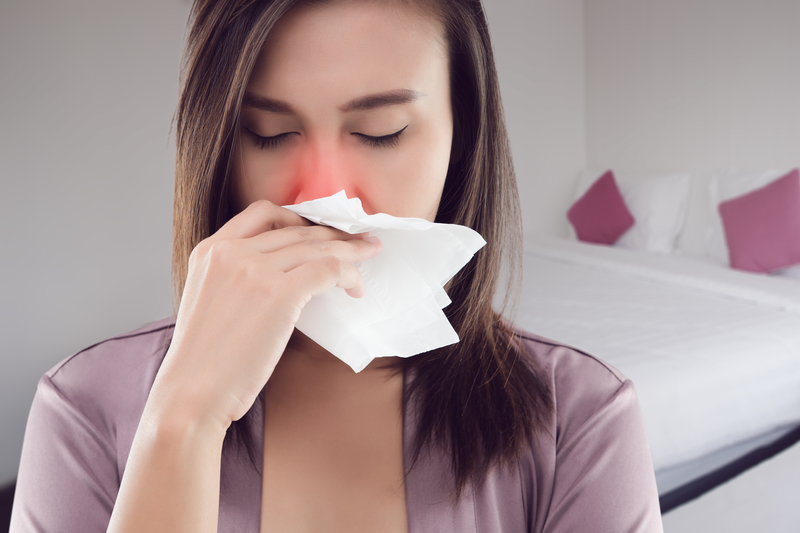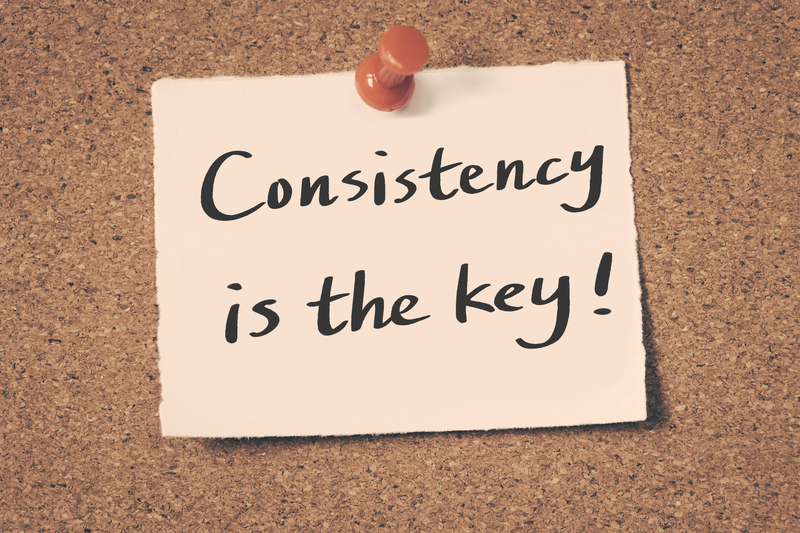
Do you find that year after year, once the weather changes, you find yourself feeling sick beyond belief?
Seasonal allergies affect about thirty percent of the population, which is quite a lot of people.
Symptoms vary as does the severity of the symptoms, but there’s one thing that every allergy sufferer has in common, which is that they’re desperate for relief.
Today, there are a lot of different allergy treatments on the market.
However, there’s one potential treatment that’s becoming more and more popular, and that’s CBD.
Today, we’ll be discussing the unique relationship between CBD and your immune system to illustrate how this cannabinoid might be able to help you with your symptoms while improving the overall way in which your body handles exposure to common allergens like dust, grass and pollen.
But, before we do that, let’s take a closer look into how allergies develop in the first place.
What Are Seasonal Allergies?

With each changing season comes a new host of allergens, which are elements to which people may have an allergic reaction.
Seasonal allergies, therefore, are allergies that occur at the change of a season.
Most people with seasonal allergies are affected during the spring, when grass, pollen and other elements emerge for the first time all year.
However, people can have seasonal allergies during any season.
Symptoms of Seasonal Allergies

Anyone who suffers from seasonal allergies year after year is well aware of the variety of symptoms that occur.
For most people, chronic symptoms are nasal congestion, throat irritation and itchy eyes.
These symptoms, obviously, get worse the more exposed you are to the allergen.
In other words, the symptoms become more severe when you are outdoors midday when pollen’s presence is at its peak.
However, there are other symptoms associated with seasonal allergies that are less common but just as annoying.
One is itchy skin that results from a severe histamine response.
Some people may even develop mild cognitive impairment known as “brain fog” due to the fact that the immune system is overworking which leaves little energy left for the brain.
And, some people may experience sinus headaches and lightheadedness during allergy season, mostly due to the swelling of the nasal passages.
Causes of Seasonal Allergies
Seasonal allergies, as you know, don’t affect everyone, which means that there must be something going on in the body of the sufferer, as the allergens themselves aren’t the actual problem.
As you know, the immune system’s job is to keep foreign invaders from entering the body and causing an infection.
The immune system works very hard to stop bacteria and viruses from making their way into the cells of the body, and it does this by creating an inflammation response that blocks these invaders.
Those who have seasonal allergies experience a faulty immune response.
Essentially, the immune system mistakenly thinks that allergens are threats to the body that can lead to infection.
So, the immune system inflames the passageways to prevent allergens from entering, which is why these passageways become so swollen.
However, the allergens are not actually threatening at all.
It’s not completely known why some people have allergies and some don’t, but it likely has to do with a combination of genetics, lifestyle habits and overall function of the immune system.
For instance, it’s believed that a person with a compromised immune system due to an illness will have a much stronger reaction to seasonal allergens than someone who has a healthy immune system.
How Are Seasonal Allergies Diagnosed?
Seasonal allergies can be diagnosed in two ways.
Doctors may diagnose allergies based on the presence of allergy symptoms that occur year after year.
Or, they may choose to do an allergy test that involves exposing the body to certain allergens and seeing how the immune system reacts.
While an allergy test is more comprehensive, those who suffer from the same symptoms year after year can determine for themselves that they have seasonal allergies.
How Are Seasonal Allergies Usually Treated?

Seasonal allergies are treated with allergy medications that may be prescribed or purchased over the counter.
These medications are known as antihistamines, and they prevent the immune system from creating histamines which cause the inflammation response to occur.
Can CBD Help with Seasonal Allergies?
If you’re the type of person who prefers to treat an ailment in a natural and holistic way, you may want to look into using CBD the next time those pesky allergy symptoms flare up.
It’s currently believed that CBD has the potential to help calm those symptoms at their root cause by helping the immune system become more tolerant to allergens.
You see, CBD that comes from the hemp plant is a phytocannabinoid.
Phytocannabinoids are cannabinoids that are derived from plant sources.
There are also endocannabinoids which are naturally produced by the body.
The body is supposed to produce a certain number of endocannabinoids in order to feed the endocannabinoid system that’s responsible for maintaining homeostasis throughout the bodily systems.
But, if the body is deficient in endocannabinoids, homeostasis is unattainable.
Phyotcannabinoids like CBD feed the endocannabinoid system so that it can once again regulate the body’s many important systems.
One of the systems for which the endocannabinoid system is responsible is the immune system.
If you are lacking in cannabinoids, the immune system may become hypersensitive, perceiving harmless things like seasonal allergens as dangerous threats that require an inflammation response, leading to symptoms like congestion, headaches and more.
How Can You Take CBD for Seasonal Allergies?
Now that you know how CBD can help the immune system calm down during allergy season, it’s time to learn about how best to take this cannabinoid for the best results.
High-Quality, Potent CBD is Key
If you’re going to invest in CBD to fight those allergy symptoms, it’s crucial that you go with the highest-quality CBD product that you can find.
CBD is an unregulated industry right now, meaning that lots of companies are getting away with producing cheap products with a low potency.
But, it’s easy to do some research and find a company that’s worth your money.
Speak with Your Doctor First

Before you use CBD to treat any ailment, always talk to your doctor beforehand.
They will examine your medical history in order to determine whether or not CBD is right for you.
From there, they usually send you to an allergy specialist/doctor who then will give you some guidance so that you take it in a way that’s highly effective.
Take CBD Daily

Taking CBD daily is the best way to test its potential for fighting allergies.
That’s because if you’re deficient in endocannabinoids, you need to give it a chance to build up in your body.
Start out by taking the same dosage level at the same time each day for a few weeks before assessing the progress.
Consider Different Administration Methods and How They Differ in Terms of Effects
Remember, CBD comes in the form of vape oils, tinctures, edibles and more.
CBD products that pass through the digestive system such as edibles and capsules will provide you with longer-lasting results but will take a while to take effect.
CBD products that you can vape will provide short-lived results, but they act quickly.
And, oral tinctures are somewhere in the middle, which is why many allergy sufferers prefer this method of administration.
Choose Your Dosage Level Wisely
Remember that how much CBD you should take largely depends on both your size and the severity of your symptoms.
Use these factors to determine the ideal dosage level for your needs.
The one thing we can recommend though, start at a low dose and stick with it for 1 – 2 weeks before incrementally increasing your dose.
Continue doing this until you experience the results you’ve been searching for!
CBD Just May Help You Combat Those Pesky Allergy Symptoms
CBD just might help you battle those allergy symptoms so that you can enjoy the changing seasons without any worry.
Just make sure that you choose your product wisely, use it correctly and speak to your doctor first. Good luck!












